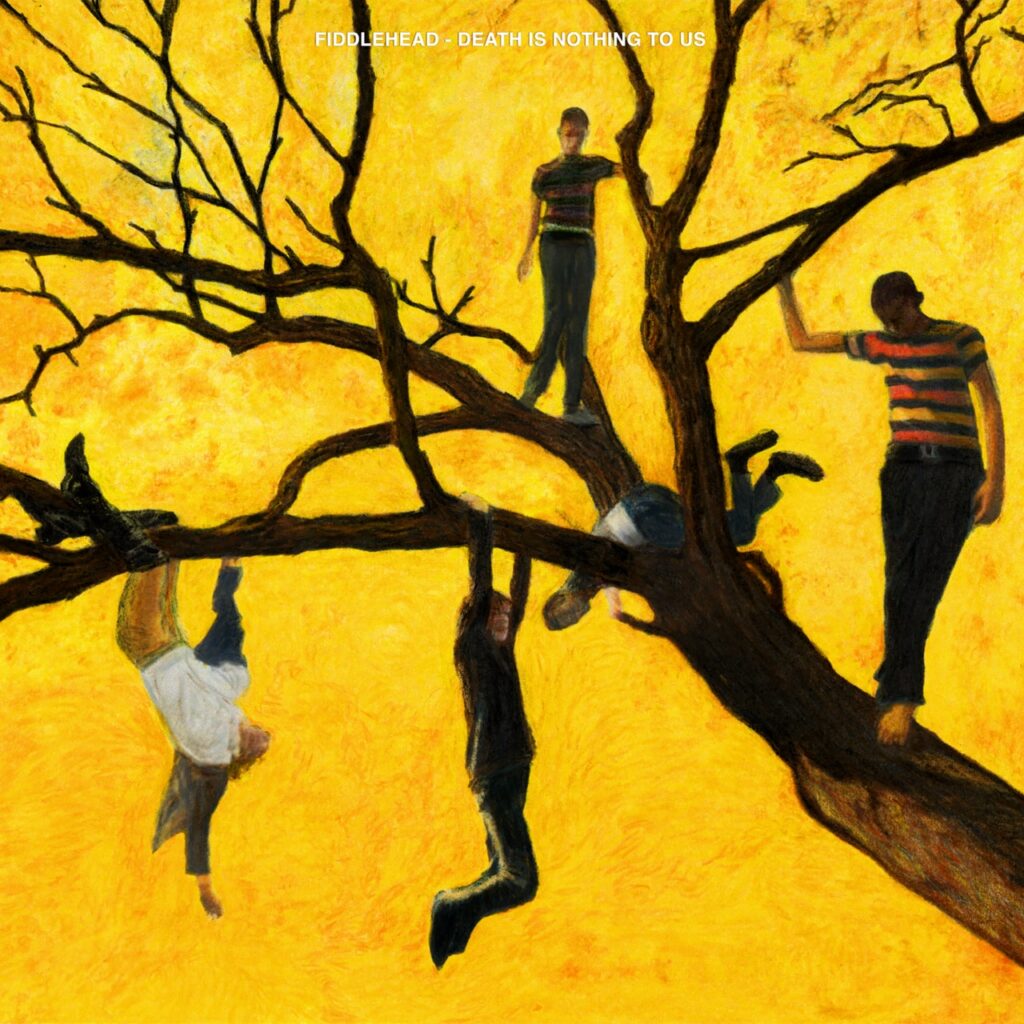An inevitable part of the grieving process is realizing that you’re not, in fact, done grieving. Have Heart frontman and hardcore lifer Pat Flynn lost his dad, a Vietnam veteran and high-school English teacher, in 2010. When witnessing his mother’s enduring grief became too heavy, Flynn worked through the secondhand struggle with Springtime and Blind, the 2018 debut album by his post-hardcore band Fiddlehead. Flynn welcomed his own child into the world shortly afterward, and he confronted the cruelty of entering fatherhood in the absence of his own dad on 2021’s Between the Richness. Now Fiddlehead’s third studio album, Death Is Nothing to Us, completes a thematic trilogy on grief, depression, and fighting to move forward.
A high-school history teacher by day and poetry disciple by night, Flynn is keenly aware of how long it takes to process life events, but he also knows better than to romanticize depression. On Death Is Nothing to Us, he comes face to face with the denial stage of grief and works to both acknowledge and overcome it. Grounded by drummer Shawn Costa and bassist Nick Hinsch’s pounding rhythm section, Flynn yells about sleeping away the pain, leaning on friends, and the desire to burn in effigy. While attending Catholic middle school, Flynn was occasionally pulled from class to serve as an altar boy at unattended day funerals, his knees digging into the stiff carpet while contemplating a life forgotten. At his most reflective, he seems to channel that experience here. Yet for all that gloom, Flynn always checks himself. On “Sullenboy,” he refuses to cede control to those “depressive Irish genes” in the name of his two toddlers. “Their day is young and their future’s wide, and I’ll die before I don’t help them rise,” he swears.
Flynn centers the album around the intersection of isolation and togetherness. On “True Hardcore (II),” he sings of the hardcore scene’s ability to unify: “Deeply depressed kids seeking art to mean more than a gathering of friends.” Both that song and “The Woes” reach their emotional peaks by inviting other artists—Angel Du$t’s Justice Tripp and 108’s Kate-08, respectively—to sing along, emphasizing both a shared feeling of loss and a community’s ability to soothe. Flynn peppers his other lyrics with lines borrowed from poets like W.B. Yeats and peers like Alex G, Infest, and the Cranberries. In its openness to outside influence, Death Is Nothing to Us reads like a thank-you note to those who helped Flynn clear away the fog of mourning.
Fiddlehead’s most emo trait has long been the way the band surges evocatively beneath Flynn’s singing. Guitarists Alex Henery and Alex Dow are deeply in tune with him this go around, utilizing the space for two guitars to duel and collaborate in equal measure. From the double-tracked slides on “The Woes” to the dense riffs of “Welcome to the Situation,” they play off one another with precision. During raucous opener “The Deathlife,” Costa fires off creative fills with a cool-headed humility that’s come to define his drumming style. Fiddlehead have never sounded more gargantuan than on “Fifteen to Infinity,” a tender love song that soars with the blissed-out tones of a shoegaze opus. Whereas the band’s previous albums opted for immediate hooks and overarching heaviness, Death Is Nothing to Us scales back. These songs are measured and warm, prioritizing nimble bass and guitar work that’s more reminiscent of Lungfish than Drug Church. Flynn himself sounds softer around the edges, too, his singing voice now just as strong as his scream.
Death never loses its power, but Flynn isn’t so fearful of it anymore. If anything, 13 years after his dad’s unexpected passing, he has learned how to accept it: confront it head on. “I feel the fear,” Flynn yells on “Sullenboy.” “So face it all and watch it, see it, feel it grow.” Fiddlehead are so in sync across the entirety of Death Is Nothing to Us that Flynn’s pain transforms from something personal into a shared catharsis felt by all. That’s especially apparent on closer “Going to Die,” a liberating anthem of defiance that crashes through joyous riffs. “I just can’t trade all the richness of life,” Flynn declares, freedom ringing in his voice. Looping, overlapping lines—“See you on the other side” and “I know I will, but I don’t wanna die”—end the song by cutting off abruptly, leaving a wall of silence. It’s Fiddlehead offering a proposal: get busy living or get busy dying. They sound relieved to know their choice.
All products featured on Pitchfork are independently selected by our editors. However, when you buy something through our retail links, we may earn an affiliate commission.

